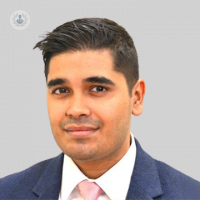Can sleep apnoea affect my child's development?
Written by:Sleep apnoea is a condition that causes your breathing to stop and start as you sleep. In his latest article, highly-respected paediatric and general ENT surgeon Mr Kiran Varad explains this condition in detail, with a focus on how sleep apnoea can affect children.

What is sleep apnoea? How can it affect children?
Sleep apnoea occurs when your child stops breathing for periods during their sleep. The most common type of sleep apnoea is obstructive sleep apnoea. The obstruction in children is usually due to large tonsils and adenoids. Allergies can also cause a stuffy nose that can worsen the symptoms.
Inadequate sleep can lead to irritability and problems with your child’s development. This can impact their progress in nursery and school.
What are the signs of sleep apnoea in children? When should you see a doctor?
Children with sleep apnoea snore loudly and pause their breathing on multiple occasions during the night. They may also sleep with their head and neck tilted backwards as this position allows them to breathe easier.
During the daytime children are often tired and irritable. Their developmental progress may be limited, and this can translate to issues at nursery or school.

How serious is sleep apnoea?
In most children, sleep apnoea is not serious, but will reduce the quality of their life and can hinder development. The majority of children with mild sleep apnoea will grow out of it (usually by the age of 6).
Rarely, persistent untreated severe sleep apnoea can lead to problems with growth as well as heart and lung problems.
How is sleep apnoea in children diagnosed?
The diagnosis is largely based on the history and description of how your child sleeps. A video of your child sleeping gives a very clear picture. I encourage patients to take multiple videos of their child sleeping prior to their clinic appointment.
A thorough examination of your child is essential. This includes looking inside the mouth for large tonsils and assessing how well air flows through your child’s nose (this is usually done with a mirror to see if it mists when your child sniffs out). In some children, an endoscopic examination is required to check for large adenoids at the back of the nose. This is a straightforward and well-tolerated procedure.
If the diagnosis is unclear, or your child has other severe medical conditions a sleep study is required. A sleep study measures oxygen levels, heart rate, respiratory rate, brain activity and leg and chest movement whilst they sleep. A sleep study can confirm if your child has sleep apnoea and how severe it is.

How is the condition treated?
The treatment options include:
A watch-and-wait approach in mild cases (most children will grow out of this condition as their tonsils and adenoids shrink and they get bigger).
Medical treatment, usually in the form of steroid and saline sprays to clear your child’s nasal passages is another effective treatment.
Another effective treatment is surgery in the form of any combination of tonsillectomy, adenoidectomy and reducing the size of the lining of your child’s nose (turbinate reduction). Surgery is very safe with minimal risks. Tonsillectomy in particular is now a safe and relatively painless procedure with the advent of Coblation technology.
Coblation intracapsular tonsillectomy entails removing the majority of tonsil tissue but leaving a small remnant behind that protects the underlying muscles and reduces bleeding risk and pain.
Can children outgrow sleep apnoea? Is it curable?
The majority of children will only have mild sleep apnoea and grow out of it by the age of 6. In children with more severe and persistent symptoms, and large tonsils and adenoids, surgery has excellent success rates with minimal risk.
You can find out more about Mr Kiran Varad and his work by clicking here and here.
Mr Kiran Varad is a leading consultant paediatric and general ENT surgeon based in London & Guildford. If you are worried that your child may be suffering from sleep apnoea or any other ENT condition, please don’t hesitate to book a consultation with Mr Varad today via his Top Doctors profile.


